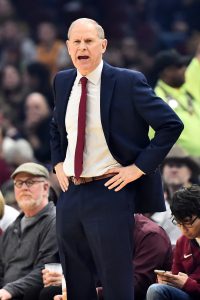In John Beilein’s case, the doubters turned out to be right.
After four decades in the college game, the 67-year-old coach wasn’t able to handle the adjustment to the NBA. The lifestyle, the personalities and the expectations of his players were all foreign to Beilein, who built his reputation guiding athletes between the ages of 18 and 22.
While he had his share of those with the rebuilding project in Cleveland, the atmosphere is different in the NBA. The coaches have all the power in college, but in the pro ranks the balance shifts to the players, who weren’t receptive to long practices and intense film sessions in the midst of an already-grueling 82-game schedule. Beilein seemed out of place both on and off the court as he tried to adapt to the game strategies and player management techniques of a league that was totally new to him.
Beilein resigned today in a move that everyone knew was coming. His 14-40 record and a growing litany of player complaints made the parting inevitable.
He becomes the latest successful NCAA coach to crash and burn in the NBA, joining a large group that includes John Calipari (72-112 with the Nets), Rick Pitino (192-220 with the Knicks and Celtics), Tim Floyd (90-231 with the Bulls and Hornets) and Jerry Tarkanian (9-11 in a brief 20-game stay with the Spurs).
But regardless of the results, some NBA teams believe the solution to their problems can be found on a college campus. The Knicks, for example, reportedly expressed interest in both Calipari and Villanova’s Jay Wright to take over the team next year.
The Celtics’ Brad Stevens, one of the few to successfully transition from college to the NBA, met with Beilein in the summer of 2018 while he was considering an opportunity with the Pistons. Stevens, who reached the NCAA title game twice at Butler, talked to Chris Fedor of Cleveland.com in October about how to he was able to make the transition work.
“I think one of the great things about being here (in Boston) is that we have unbelievable leadership in our front office and ownership and they don’t ride the highs and lows — a game, a week, a month, they just kind of stay the course,” Stevens said. “I really appreciate that. You feel empowered to work in that environment. … If you’re looking at it coming from a college situation where you have a lot of job security I think the question you want to know is, ‘there will be ups and downs and is it going to be something they recognize they can’t overreact to one bad week or bad month?’”
We want to get your opinion. Is it a mistake for NBA teams to look to the college ranks for head coaches? Or are there a lot more potential success stories out there like Stevens just waiting for an opportunity? Please leave your responses in the space below.
